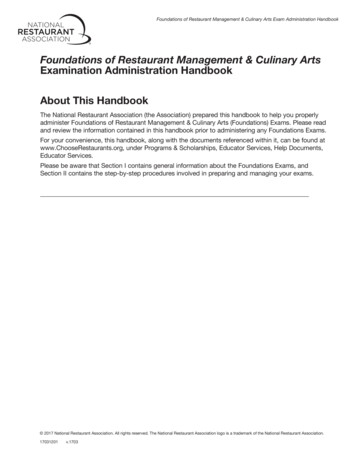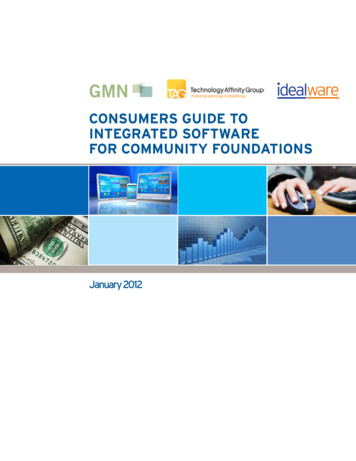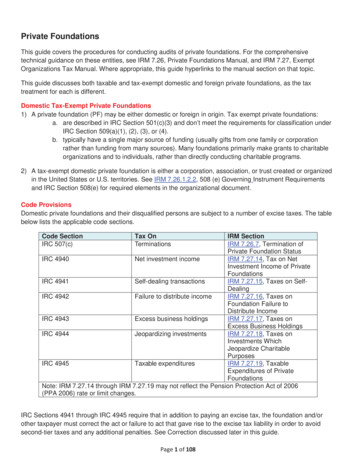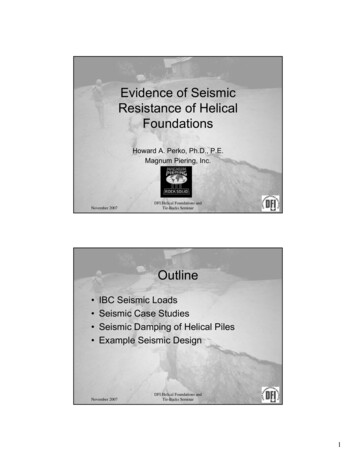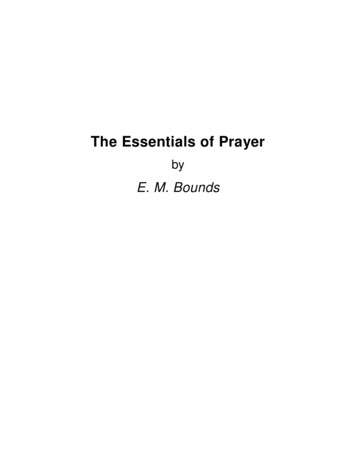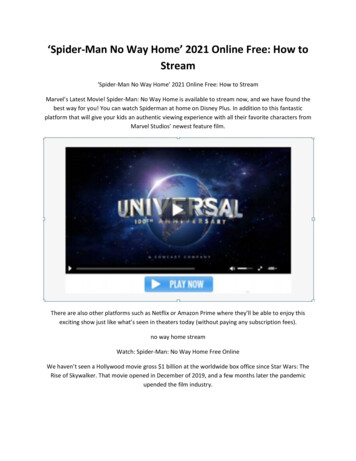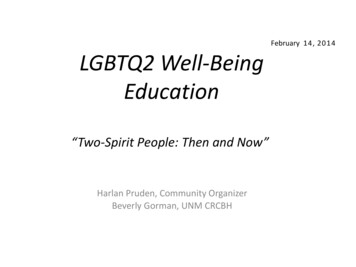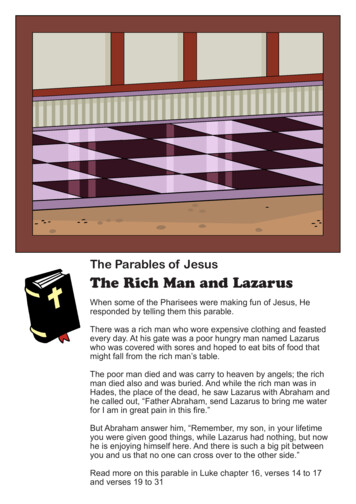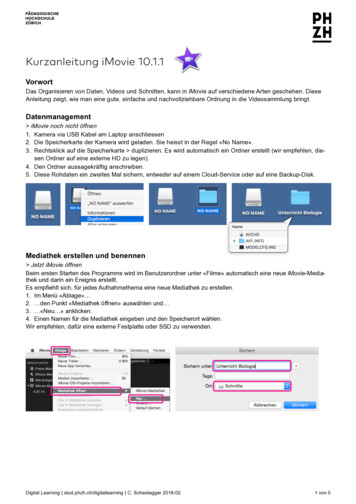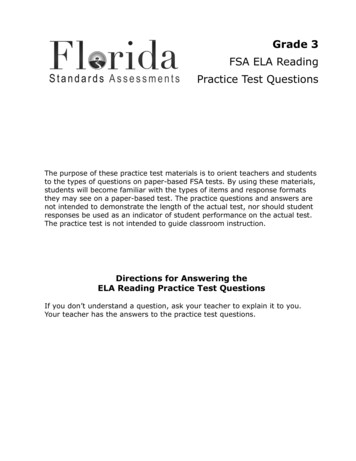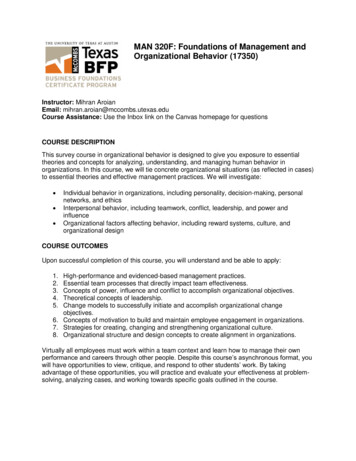
Transcription
MAN 320F: Foundations of Management andOrganizational Behavior (17350)Instructor: Mihran AroianEmail: mihran.aroian@mccombs.utexas.eduCourse Assistance: Use the Inbox link on the Canvas homepage for questionsCOURSE DESCRIPTIONThis survey course in organizational behavior is designed to give you exposure to essentialtheories and concepts for analyzing, understanding, and managing human behavior inorganizations. In this course, we will tie concrete organizational situations (as reflected in cases)to essential theories and effective management practices. We will investigate: Individual behavior in organizations, including personality, decision-making, personalnetworks, and ethicsInterpersonal behavior, including teamwork, conflict, leadership, and power andinfluenceOrganizational factors affecting behavior, including reward systems, culture, andorganizational designCOURSE OUTCOMESUpon successful completion of this course, you will understand and be able to apply:1.2.3.4.5.High-performance and evidenced-based management practices.Essential team processes that directly impact team effectiveness.Concepts of power, influence and conflict to accomplish organizational objectives.Theoretical concepts of leadership.Change models to successfully initiate and accomplish organizational changeobjectives.6. Concepts of motivation to build and maintain employee engagement in organizations.7. Strategies for creating, changing and strengthening organizational culture.8. Organizational structure and design concepts to create alignment in organizations.Virtually all employees must work within a team context and learn how to manage their ownperformance and careers through other people. Despite this course’s asynchronous format, youwill have opportunities to view, critique, and respond to other students’ work. By takingadvantage of these opportunities, you will practice and evaluate your effectiveness at problemsolving, analyzing cases, and working towards specific goals outlined in the course.
REQUIRED MATERIALSAll materials are provided electronically. The link for you to pay for your materials is provided onCanvas (see Getting Started module). You must pay for your materials before you can enter thecourse. Textbook: Osborn, Richard, N & Schermerhorn Jr, John, R, & Uhl-Bien, Mary.(2014). Organizational Behavior. Hoboken, N.J. John Wiley & Sons, Inc. Online Articles/Resources/Materials: These textbook, readings and materials arecovered in your course materials fee and are provided through Canvas.SOUTHWEST AIRLINES VIDEO SERIESThroughout this course, you will have the chance to watch Southwest Airlines executivesdiscuss their philosophies on various course related content. These executives will connecttheir personal experience to course content that you will be learning about. Please pay specialattention to these videos as your final paper will ask you to connect this video content to whatyou have learned throughout the course.There will be six videos in this series discussing emotional intelligence (Unit 2), motivation (Unit4), individual decision making (Unit 5), teams (Unit 6), leadership (Unit 8), and culture (Unit10). Videos will appear in different places in their respective unit, but will all be labeledwith Southwest Airlines Video Series for your easy identification.ASSIGNMENTS AND EXAMSPlease note that the activities in this course build in complexity as the course progresses; theactivities in the first half of the course are considerably less time-intensive than the activities inthe latter half of the course.QuizzesThere are graded quizzes at the end of units 3, 5, 7, and 10. Each quiz comprises 20 questions. Time limitation: 45 minutes.Time begins from the moment you start a quiz and runs continuously: once time beginsthere is no way to pause it, including loss of connectivity or logging out, so please planaccordingly and make sure you have a strong internet connection. Number of attempts allowed before submission. One. Once you submit youranswers, you will not be able to edit them. Resources you may use: Written and digital materials and a self‐created note sheet.Direct or indirect assistance from any individual(s) is(are) STRICTLY PROHIBITED andis an unequivocal violation of the McCombs School of Business Code of Ethics and theUniversity’s policy on Academic Dishonesty and Cheating.
Your ability to use the allowed resources will be constrained by the time limit and youare only allowed one attempt at each quiz.RECOMMENDATION. In addition to diligent review and practice before taking each quiz, it ishighly recommended that you craft a self-created note sheet for use during the quiz—it is anexcellent aid for reviewing the material and taking the quizzes.Your performance on graded quizzes is worth 30% of your final grade.ExamsEach exam is closed-book, closed-note, closed-material; you are not to access any materialsduring the exam. Each exam has 50 questions and you will have 90 minutes to complete theexam. The exams are not cumulative. In general, 80-90% of the questions will come from thetextbook readings and 10-20% will come from the various cases, exercises and readings. Formore information, see the exam overview pages.You must pass the final exam to pass the course.Online ActivitiesIn addition to the assessments, you are expected to participate in all of the online activities inthis course, including discussion forums, video-based peer exchanges, ungraded knowledgechecks, and case analyses. These activities are designed to supplement the readings andsupport your learning, and are required to unlock the assessments.GRADES AND COURSE EXTENSIONSYour final grade for the course will be calculated as follows:4 Quizzes30%Midterm Exam35%Final Exam35%You must pass the Final Exam to pass the course. You must also earn an overall passinggrade:A100-93%A-92-90%B 89-86%C 79-76%D %COURSE POLICIES AND PROCEDURESCourse PolicesF 59-0%
You are encouraged to access this course daily including weekends. By doing so you will beable to actively participate, complete your assignments, and access announcements in a timelymanner.Academic Integrity – University of Texas at AustinStudents of the University of Texas and this course may not share or distribute materials thatcould be an advantage to another current or future student. Violations are indefensible acts ofscholastic dishonesty. For more on the University of Texas policy of Academic Dishonesty andCheating, follow the link at holastic DishonestyThe McCombs School of Business has no tolerance for acts of scholastic dishonesty. Theresponsibilities of both students and faculty with regard to scholastic dishonesty are described indetail in the BBA Program’s Statement on Scholastic Dishonestyat spxBy teaching this course, I have agreed to observe all faculty responsibilities described in thatdocument. By enrolling in this class, you have agreed to observe all student responsibilitiesdescribed in that document. If the application of the Statement on Scholastic Dishonesty to thisclass or its assignments is unclear in any way, it is your responsibility to ask me for clarification.Students who violate University rules on scholastic dishonesty are subject to disciplinarypenalties, including the possibility of failure in the course and/or dismissal from the University.Since dishonesty harms the individual, all students, the integrity of the University, and the valueof our academic brand, policies on scholastic dishonesty will be strictly enforced. You shouldrefer to the Student Judicial Services website at http://deanofstudents.utexas.edu/sjs/ to accessthe official University policies and procedures on scholastic dishonesty as well as furtherelaboration on what constitutes scholastic dishonesty.
Academic Integrity and MAN 320fStudents are not allowed to use outside materials. All required materials are provided in Canvasand there is no need to use outside materials such as, but not limited to, Quizlet andCourseHero. Failure to abide by this may result in an academic integrity violation and may bereported to Student Conduct and Academic Integrity. Sanctions may include up to an F in thecourse and suspension. Discussing classroom assignments, exams and quizzes outside ofCanvas is strictly prohibited. This includes sites, but not limited to, GroupMe, Facebook, andGoogle.Posting, copying or utilizing sites such as CourseHero, Quizlet, and other such services isstrictly forbidden. You are expected to complete 100% of this course strictly based on thematerial provided in Canvas. The use of outside resources is a violation of the course rules andwill be reported to the Dean of Students as academic dishonesty. A special note aboutGroupMe and other similar websites. If GroupMe (and other similar websites) are used to shareinformation related to questions and answers on quizzes or exams, this will be considered aviolation of the course rules and considered academic dishonesty.In addition to the assessments, you are expected to participate in all of the online activities inthis course, including discussion forums, video-based peer exchanges, ungraded knowledgechecks, and case analyses. These activities are designed to supplement the readings andsupport your learning, and are required in this course and to unlock graded assessments.Regarding the discussion forums, case questions and other non-graded homeworkassignments, your responses need to demonstrate a well thought-out and cohesive argument.Simply responding with one or two words may meet the criteria to unlock the next assignmentbut it does not demonstrate your learning nor does it contribute to the body of knowledge aboutthe issue at hand. In the past, I have seen students do this repeatedly and will not tolerate suchbehavior. Even though discussion forums, case questions and other required submissions arenot graded, if your responses to the required homework submissions are clearly an attempt tosimply unlock the next assignment, this will be considered academic dishonesty. The sameholds true for all other ungraded assignments such as the case quizzes where the final questionspecifically asks “I have attempted to answer all questions to the best of my ability.” Myexpectation is that you will provide a thoughtful and relevant response to each of the questionsbefore submitting your responses. Simply adding no relevant content or inappropriateresponses to simply unlock the next module will be considered academic dishonesty andreported to the Dean of Students.
Course OutlineUNITCOURSE ACTIVITIESUnit 1:Introduction toManagementReading and Online Content Textbook, Chapter 1 – Introducing Organizational Behavior Key Concepts Home Towne Hardware case studyActivities Poll(s) Home Towne Hardware Case AnalysisUnit 2:Personality &EmotionalIntelligenceReading and Online Content Textbook, Chapter 2 (pp. 29---35, 40---45) – Diversity, Personality, andValues Textbook, Chapter 4 (pp. 76---82) – Emotions, Attitudes, and JobSatisfaction Key Concepts Emotional Intelligence and Emotional Leadership SWA Video SeriesActivities Big 5 Personality Test Discussion Forum: Emotional Intelligence in Hiring Practice Quiz: Big 5 Personality TraitsUnit 3:Perception,Social Identity,& BiasesReading and Online Content Textbook, Chapter 3 – Perception, Attribution, and Learning Key ConceptsActivities Poll(s) What is Happening Here? Social Learning Theory Employer/Employee ExpectationsAssessment: Quiz 1Unit 4:MotivationReading and Online Content Textbook, Chapter 5 – Motivation Textbook, Chapter 6 – Motivation and Performance Key ConceptsActivities Poll(s) Case Analysis Discussion Forum: National Burgers SWA Video SeriesUnit 5:IndividualReading and Online Content Textbook, Chapter 9 – Decision Making and Creativity
Decision--Making Carter Racing case study Key ConceptsActivities Poll(s) Decision Biases and Heuristics Movie Mogul Runaway TrolleyAssessment: Quiz 2Assessment: Midterm Exam (Units 1-5)Unit 6:TeamsReading and Online Content Textbook, Chapter 7 – The Nature of Teams Textbook, Chapter 8 – Teamwork and Team Performance Key Concepts SWA Video Series The Team That Wasn’t case studyActivities Discussion Forum: Team Experiences Making Teams Work Better Case Analysis Discussion Forum: The Team That Wasn’t The Team That Wasn’t, Part 1 The Team That Wasn’t, Part 2 Murder MysteryUnit 7:Power,Influence &ConflictReading and Online Content Textbook, Chapter 10 – Conflict and Negotiation Textbook, Chapter 12 – Power and Politics Key Concepts Power and Influence: Achieving Your Objectives in Organizations Thomas Green: Power, Office Politics and a Career in Crisis case studyActivities Poll(s) Case Analysis Discussion Forum: Thomas Green Environmental Program Participation Using Power to Manage Conflict in the Thomas Green CaseAssessment: Quiz 3Unit 8:LeadershipReading and Online Content Textbook, Chapter 13 – The Leadership Process Textbook, Chapter 14 – Leader Traits and Behavior Styles Key Concepts SWA Video Series Leadership That Gets Result
Merck Sharp & Dohme Argentina, Inc (A) case Merck Sharp & Dohme Argentina, Inc (B) caseActivities Tower---Building Mosquera’s Value System How Mosquera Has Fundamentally Changed the Organization Case Analysis Discussion Forum: Mosquera’s Options What Should Mosquera Do?Unit 9:OrganizationStructure andDesignReading and Online Content Textbook, Chapter 16 – Organizational Structure and Design Key Concepts (Videos) Remaking Microsoft: Why America’s Most Successful Company Neededan OverhaulActivities Poll(s) The Jupiter Corporation (discussion forum) Six Dimensions of Structure Microsoft’s Dynamic Structure practice quizUnit 10:OrganizationCultureReading and Online Content Textbook, Chapter 15 – Organizational Culture and Innovation Key Concepts SWA Video Series Leading by Leveraging Culture How to Change a Culture: Lessons From NUMMIActivities Poll(s) A Conversation with Professor Dierking about Leveraging Culture SnapApps, Part 1 SnapApps, Part 2 A Conversation with Professor Dierking About Culture’s Effects onOrganizationsAssessment: Quiz 4Unit 11:OrganizationalChangeReading and Online Content Key Concepts Pierre Frankel in Moscow (A): Unfreezing Change case study Pierre Frankel in Moscow (B): Unfreezing Change case study Pierre Frankel in Moscow (C): Unfreezing Change case study Leading Change: Why Transformation Efforts Fail case studyActivities Poll(s) Case Analysis Activity: Leading Change, Part A Practice Quiz: Why Transformation Efforts Fail Kotter’s 8 Steps Change Plan Comparison
Assessment of Frankel’s Change LeadershipAssessment: Final Exam (Units 6-11)
How This Course WorksThis course is online and is self‐paced. Students have five months from their date of enrollment tocomplete the course. All coursework and proctored exams are submitted or taken online.While this course is self‐paced in terms of when you complete the work and submit assignments,periodic assessments are critical to ensuring that students receive adequate support and are able toachieve the intended learning outcomes. Thus, this course is organized into modules that must becompleted in order. Students will only be able to move forward once they have received a grade on allassessments within a given module.Review the course outline and assignment descriptions carefully. Computer‐graded assignments arescored immediately. You can expect to receive feedback on instructor‐graded assignments or examswithin three business days following submission. This does not include weekends or holidays. Requestsfor expedited grading are not accommodated, so please plan accordingly. During certain times (end ofsemester, spring break, etc.), instructors may experience higher‐than‐usual demands on their time andmay need additional time for evaluation. Students should reach out to University Extension atuex@austin.utexas.edu with any concerns regarding grading turnaround.University Extension strongly advises students to be aware of when they may need a course grade to berecorded on their transcript. It can take up to two weeks after the final exam is complete for a grade tobe officially recorded with the Office of the Registrar.Getting Help Technical Support: uextechsupport@austin.utexas.edu For content questions or questions about assignment and grades, use the Inbox tool within Canvasto contact the course instructor. For other questions (registration, transcripts, etc.), contact University Extension atuex@austin.utexas.edu or 512‐471‐2900University Extension PoliciesFull University Extension policies for self‐paced courses may be found on the University Extensionwebsite.Scholastic DishonestyStudents in this course are expected to work independently, without direct supervision, and to conductthemselves responsibly in accordance with that freedom. To obtain the greatest benefit from theircourse work, and for the sake of everyone enrolled in our courses, students must demonstrate thewillingness to exercise self‐discipline, personal responsibility, and scholastic integrity.We expect the course work and exams that you submit for course credit to be yours and yours alone.Plagiarism and other forms of scholastic dishonesty are serious academic violations that will not betolerated. The penalties for scholastic dishonesty include the possibility of failure in the course.Scholastic dishonesty in examinations will automatically result in a grade of F on the exam and an F inthe course.
5. Change models to successfully initiate and accomplish organizational change objectives. 6. Concepts of motivation to build and maintain employee engagement in organizations. 7. Strategies for creating, changing and strengthening organizational culture. 8. Organizational structure and design concepts to create alignment in organizations.
